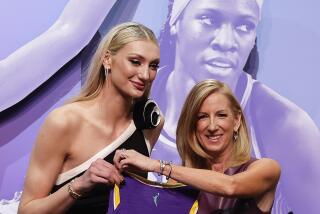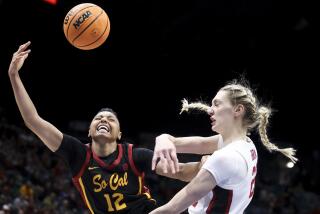The NBA / Sam McManis : DeBusschere’s Good Luck Ran Out
- Share via
According to many fans and nearly all the media representatives in New York, the only good thing Dave DeBusschere did as the New York Knicks’ general manager in the last year was pound his fists on a table in exultation after snaring the rights to Patrick Ewing at last spring’s National Basketball Assn. draft lottery.
And since it was luck, and not DeBusschere, through which the Knicks drew the first draft pick, many ardent New York fans figured that DeBusschere had done nothing right.
Executives of Gulf & Western, the conglomerate that owns the Knicks, apparently reached the same conclusion. They fired the beleaguered DeBusschere last Friday and replaced him with Gordon (Scotty) Stirling, who had been the NBA’s vice president of operations. The firing came a lot later than many had predicted, considering the heat DeBusschere had taken for the Knicks’ 11-23 start. Knick management said that the change had been contemplated for three weeks, but talk actually began when the Knicks needed almost three weeks to win their first game.
So, what terrible transgressions cost DeBusschere his job?
Among other things, DeBusschere was widely criticized for signing center Bill Cartwright to a six-year, $7.1 million contract even though Cartwright had missed all of last season with a broken foot. It took only one exhibition game this season for Cartwright to break his foot again. His career is in jeopardy. DeBusschere also took heat for failing to improve the team during the off-season, as well as for waiting until two weeks into the season to re-sign forward Louis Orr, who is now starting.
Then, there is the belief that DeBusschere, a former great Knick player, simply didn’t have the personality or background to be an NBA general manager.
Wrote New York Times columnist George Vecsey: “ . . . he did not seem to have the innate capacity for small talk, long hours, intrigue and details that most sports executives do.”
Vecsey’s brother, Peter, a columnist for the New York Post, sometimes referred to DeBusschere as “DaButcher” and blamed him for most of the problems.
Said Jack Krumpe, the Knicks’ boss, at the firing press conference: “I’m not looking to blame anyone.”
The fact is, though, that DeBusschere has taken the brunt of the blame, deservedly or not. In training camp, when writers asked Coach Hubie Brown why there weren’t more big men in camp, he answered: “Ask management.”
Now that Stirling has taken over, Brown probably won’t be so bold as to point fingers at management.
What the Knicks are getting in Stirling is an executive with years of experience both in and out of the NBA. Stirling had been the NBA’s vice president of operations--which entails evaluating officials and working on scheduling--since 1982. Before that, he held management positions with the Golden State Warriors and Utah Jazz.
With the Warriors, Stirling made several curious trades. The most curious was a 1980 deal with Boston. Stirling traded center Robert Parish and the third overall pick in the draft to the Celtics for the 1st and 13th overall choices.
Golden State used the first pick to select center Joe Barry Carroll, who has not developed into a dominating big man, and chose forward Rickey Brown, now out of the league, with the 13th pick.
Boston, meanwhile, picked Kevin McHale third overall. Parish has been an all-star the last five seasons with the Celtics.
Is Hubie next? Even though Stirling has said Brown’s job is not in jeopardy, there has been much speculation that he will be out at the end of the season, if not sooner.
Two weeks ago, the Knicks sneaked in Georgetown Coach John Thompson for an interview. It’s doubtful that Thompson would leave Georgetown in midseason, but he probably would not hesitate to make the move and reunite with Ewing after the season.
Brown says he’s not worried.
“I don’t have to prove anything to anybody,” he said. “I don’t worry about a general manager coming in and evaluating me. Give me a healthy team (Bernard King has been out the entire season after knee surgery) and I’ll produce more than anybody . . . I can back it up.”
A bizarre thing is happening in Portland. Point guard Darnell Valentine has not played in the last nine games and, as of last week, he neither practices with the team nor shows up for games.
All this happened after Coach Jack Ramsay had decided to make a concerted effort to trade Valentine, a starter for four seasons. Valentine started the first 27 games this season and was averaging 9.4 points a game when Ramsay decided to go with second-year player Steve Colter and rookie Terry Porter at point guard.
Ramsay told Valentine that he would sit until he was traded. The only problem was that the Trail Blazers didn’t think it would be this difficult to trade Valentine.
When it became obvious that Valentine was not going to play, he approached Ramsay and asked not to accompany the team on a two-game trip to Texas. Now, he’s not even around for home games.
“I feel like a man without a country,” Valentine said early last week. He hasn’t been available for comment since.
The Trail Blazers are seeking a first-round draft choice for Valentine and are finding that too steep for many teams, among them the Clippers.
Portland has called the Clippers several times about Valentine, but they want a first-round choice. The Clippers have been tempted, given the inconsistent play of Norm Nixon, but they seemingly would have to deal Nixon before obtaining Valentine.
Valentine makes $245,000 ($175,000 cash), which is about $100,000 less than the NBA average. But this is the final year of Valentine’s contract, and he’s obviously expected to ask for a more lucrative deal.
Meanwhile, Ramsay has told Portland reporters that if it looks as though Valentine will not be traded in a reasonable time, he will have a role on the team again.
There was some confusion recently about where New Jersey Net guard Micheal Ray Richardson stood in terms of the NBA’s drug enforcement policy when he checked into a Pasadena rehabilitation center last week.
Although it was Richardson’s fourth known hospitalization, it counted only as his second offense under the NBA’s rules. A third offense is banishment from the league for at least two seasons.
According to the league, Richardson’s first drug encounter occurred before the policy took effect. The second was during a three-month “grace period.”
It’s obvious, however, that Richardson has a serious drug problem. News of his latest hospitalization did not take Net players by surprise.
“To be honest, I figured it would happen sooner or later,” one Net player said. “It seems nobody ever makes it. Just look at John Lucas and John Drew. Look at baseball and football players. It’s almost like heart disease or cancer. There’s no cure for it. You can arrest it, but it always comes back.”
More to Read
Go beyond the scoreboard
Get the latest on L.A.'s teams in the daily Sports Report newsletter.
You may occasionally receive promotional content from the Los Angeles Times.










